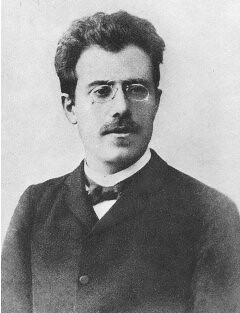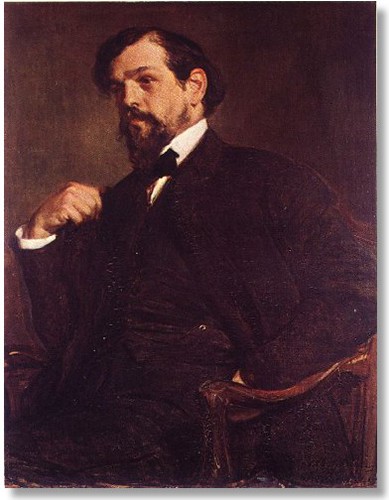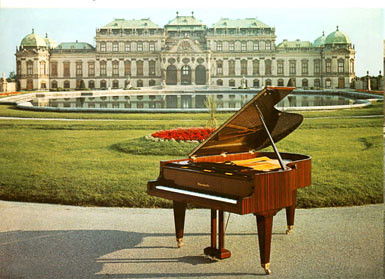  |
 Jun 9 2010, 08:06 AM Jun 9 2010, 08:06 AM
Post
#13
|
|
 Bảo vệ tổ quốc    Group: Năng Động Posts: 4,390 Joined: 5-August 09 Member No.: 4,332 Country 
|
Gustav Mahler  Lived: 1860-1911 Nationality: Austrian Era: Later Romantics Mahler was a transitional figure. A contemporary of Sigmund Freud and the painter Gustav Klimt, his massive orchestral works are rooted in the 19th-century Austro-German symphonic tradition and speak in a rich, late-Romantic idiom inflected with folk idioms, yet look forward to 20th-century preoccupations such as neurosis and mysticism. His most important works are his ten symphonies and his songs with orchestral accompaniment, which influenced them. Four of the symphonies - Nos. 2, 3,4 and 8- have substantial vocal and choral parts, which has tended to limit their performance potential, and for almost five decades after Mahler's death his works were largely neglected, admired only by a small band of devotees, until the advocacy of conductors such as Bruno Walter, Georg Solti and Rafael Kubelik in Europe, Leonard Bernstein in America and Norman del Mar in Britain, restored them to the repertoire. Mahler was born into a Jewish family and, although he later converted to Catholicism, his career was to some extent blighted by the anti-Semitic attitude of the Austrian establishment. He showed musical promise as a child, and studied at the Vienna Conservatory from 1875-78, where he wrote the cantata Das klagende Lied (The Song of Sorrow). From 1880 onwards he made his living as a conductor at provincial theatres in Upper Austria, Slovenia, Bohemia, and then at Kassel in Germany, where he composed the song-cycle Lieder eines fahrenden Gesellen (Songs of a Wayfarer), and started his First Symphony. In 1885 Mahler spent a year in Prague, and then moved to Leipzig. There he met the Weber family, who introduced him to the folk poetry collection Des Knaben Wunderhorn (The Youth's Maaie Horn, published in 1805-8). From 1887 onwards he began to set some of the Wunderhorn poems, which were reworked in his earlier symphonies. -------------------- Too much to read
Too little time |
|
|
|
 Jun 9 2010, 08:08 AM Jun 9 2010, 08:08 AM
Post
#14
|
|
 Bảo vệ tổ quốc    Group: Năng Động Posts: 4,390 Joined: 5-August 09 Member No.: 4,332 Country 
|
Claude Debussy  Lived: 1862-1918 Nationality: French Era: Early 20th Century From the late Baroque period to around 1890, mainstream Western music was firmly rooted in Germany and Austria. Not until the late 19th and early 20th centuries did the line of succession stretching from Bach to Mahler begin to branch out, with major composers emerging from Russia, Bohemia, England, Scandinavia and the USA. It was a Frenchman, Claude Debussy, who broke the German monopoly, revitalizing French music with his uniquely subtle art, and opening up a new sound-world for the 20th century. His music explored "the mysterious relationship between Nature and Imagination". Debussy's life centred on Paris, which was fast becoming the hub of European culture. He was born on 22 August 1862 in the suburb of St Germain-en-Laye, where his parents ran a china shop. The young Claude Achille and his siblings were often packed off to their Aunt Clementine in Cannes, where Debussy began to learn the piano with a former pupil of Chopin. At the age of ten he entered the Paris Conservatoire, where he unnerved his teachers with experimental harmonic improvisations at the keyboard, Despite his unorthodox tendencies, he won the coveted Prix de Rome in 1884 with his cantata L' enfant prodigue, but his sojourn in Rome was not a happy one, and he returned to Paris - where he had been conducting a love affair with a married woman - in the spring of 1887. The same year he became intoxicated with Wagner's music and in 1888 visited Bayreuth, Although Debussy later described Wagner's music as "a beautiful sunset that was mistaken for a dawn", it held a life-long fascination for him, He even began work on a Waguerian opera, but abandoned it when he realized that his own music needed to be "flexible and adaptable to fantasies and dreams". -------------------- Too much to read
Too little time |
|
|
|
 Jun 9 2010, 08:11 AM Jun 9 2010, 08:11 AM
Post
#15
|
|
 Bảo vệ tổ quốc    Group: Năng Động Posts: 4,390 Joined: 5-August 09 Member No.: 4,332 Country 
|
 -------------------- Too much to read
Too little time |
|
|
|
  |
| Lo-Fi Version | Time is now: 5th July 2025 - 03:57 AM |






